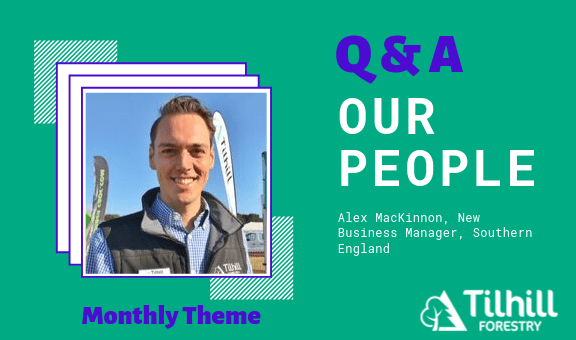This month’s theme features OUR PEOPLE. Today we talk to Tilhill Forestry’s New Business Manager Alex MacKinnon based in southern England.
What do you do? Tell us about your typical day?
I’m Tilhill Forestry’s New Business Manager for southern England. My typical day at the moment would probably involve sometime in the office working on my top-secret methods of finding new business. I might be looking for undermanaged woodlands or making sure the right people know about the grant schemes available to them. Then I’ll probably have a visit to a prospective client or one of the small sites I still manage. This is one of the most enjoyable aspects of my job as I get a kick out of finding the new woodlands, meeting the new clients, and seeing how we can help improve our woodlands.
How did you get into forestry?
By luck! I didn’t know forestry was a thing until I had a talk from a now colleague while I was at university. Turns out I had already asked the company for work experience a few years back but hadn’t made the connection! They also happened to manage the woodlands around where I grew up so it helped that I had seen the good work and enjoyed it before I considered it as a job.
What do you like most about working in the forest industry?
It seems to attract an increasingly wide variety of people, but all seem to have similar passions for the environment in one way or another. This makes it a very easy place to work as people are always friendly and have some similar interests. I also like seeing the impact we have on the landscape. I get a real sense of achievement from re-foresting denuded areas and seeing products come out of harvesting operations then seeing the site be made ready for the next generation of trees to be planted.
Why did you decide to work for Tilhill Forestry?
Back when I was leaving university and looking for a job Tilhill made me a great offer that just fitted in with what I wanted. I wanted a role that would earn me a decent salary but also keep me outdoors and in which I could make a positive impact to the environment. I was hoping to be based in Surrey but something must have got lost in the translation as they asked me to move to Scotland! As it happened, I had a great time up there and now use the experience I gained in my current role that actually is based in Surrey.
What do you like most about Tilhill Forestry?
The marketing team of course!
How do you feel Tilhill Forestry contributes to its employees’ professional development?
Tilhill Forestry has been really helpful in facilitating its employees own desires when it comes to their work life. When the time came for me to move back home, our directors facilitated it. Richard Branson’s saying: “Train your people well enough so they can leave, treat them well enough so they don’t want to” springs to mind. They’ve also encouraged employees to take on their own personal work projects within the company to further everyone’s understanding or just come up with new business ideas. Tilhill Forestry is really open to staff gaining chartered status through the Institute of Chartered Foresters and encourages us to attend regular industry meetings and days to progress ourselves.
What sorts of changes are occurring in your occupation?
Tilhill Forestry has been key in bringing in new generations to the industry with more varied backgrounds than only forestry. Thanks to this the industry now has managers with specialisms in different areas such as ecology, geology and logistics. This is an important change as the industry is adapting to being much more environmentally aware than in previous years. With epic new challenges such as climate change and population increase the types of forestry we undertake will certainly have to adapt to provide different things for different people, all the while still getting it done is more important than ever.
How does a person progress in your field?
The basics of silviculture can be relatively easily learnt but I’ve found the ability to carry out the role quickly and efficiently with confidence and quality must be gained through experience. Only with experience will a person ironically progress and move to other roles! Along the way however there’s plenty to speed things along! Stretching your knowledge base to areas related but outside of a core topic inevitably proves useful. Networking and exposure are also key to finding further opportunities.
What is your advice to anyone wishing to pursue forestry as a career?
Get after it! Don’t be shy, get in touch with some people and see what opportunities are available. Volunteering and background experience go a long way as well as formal qualifications.



